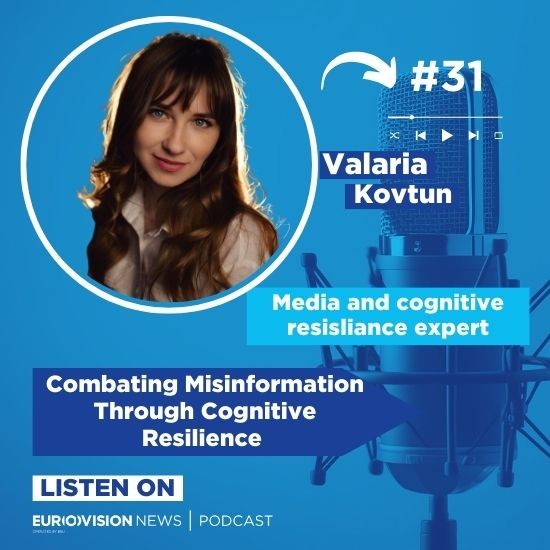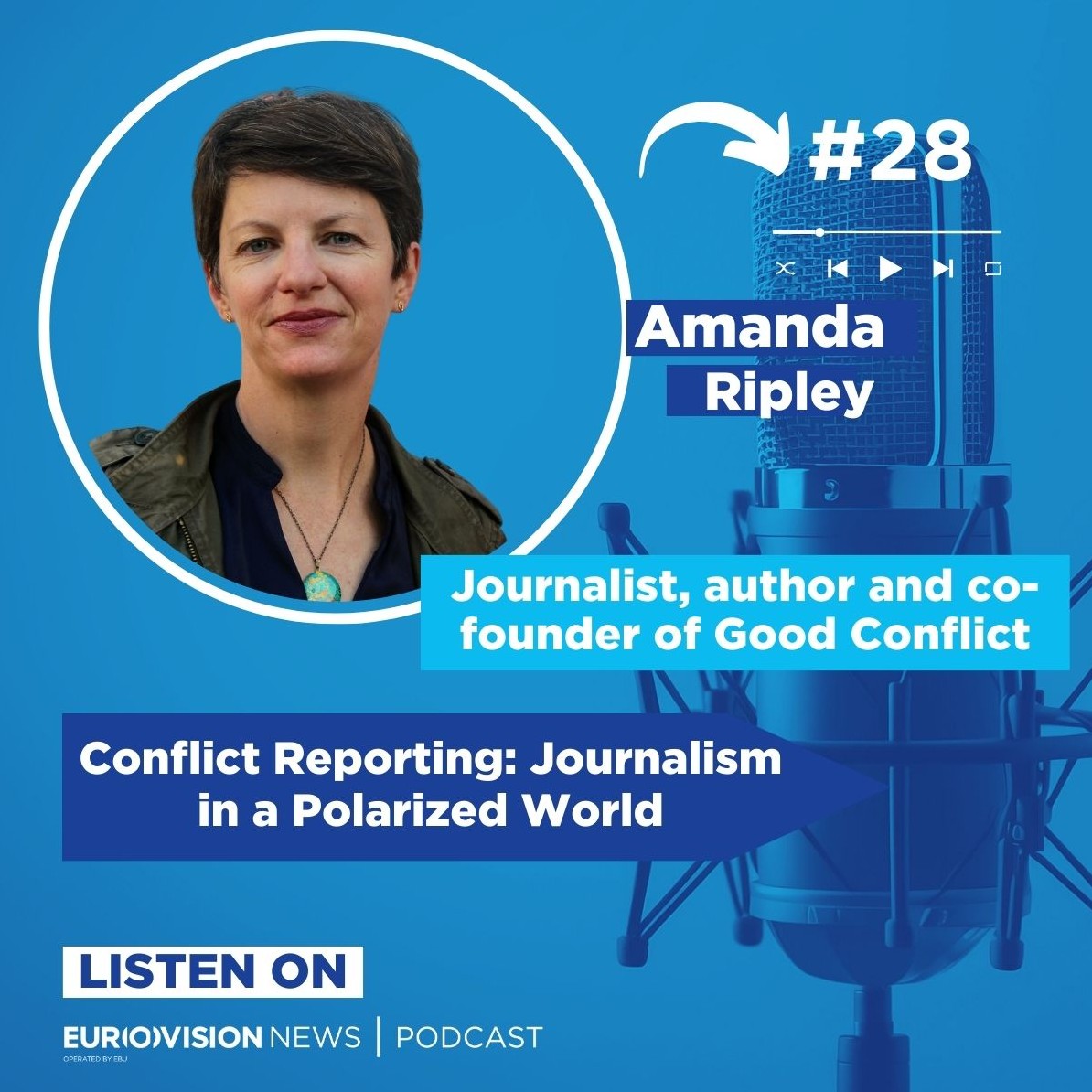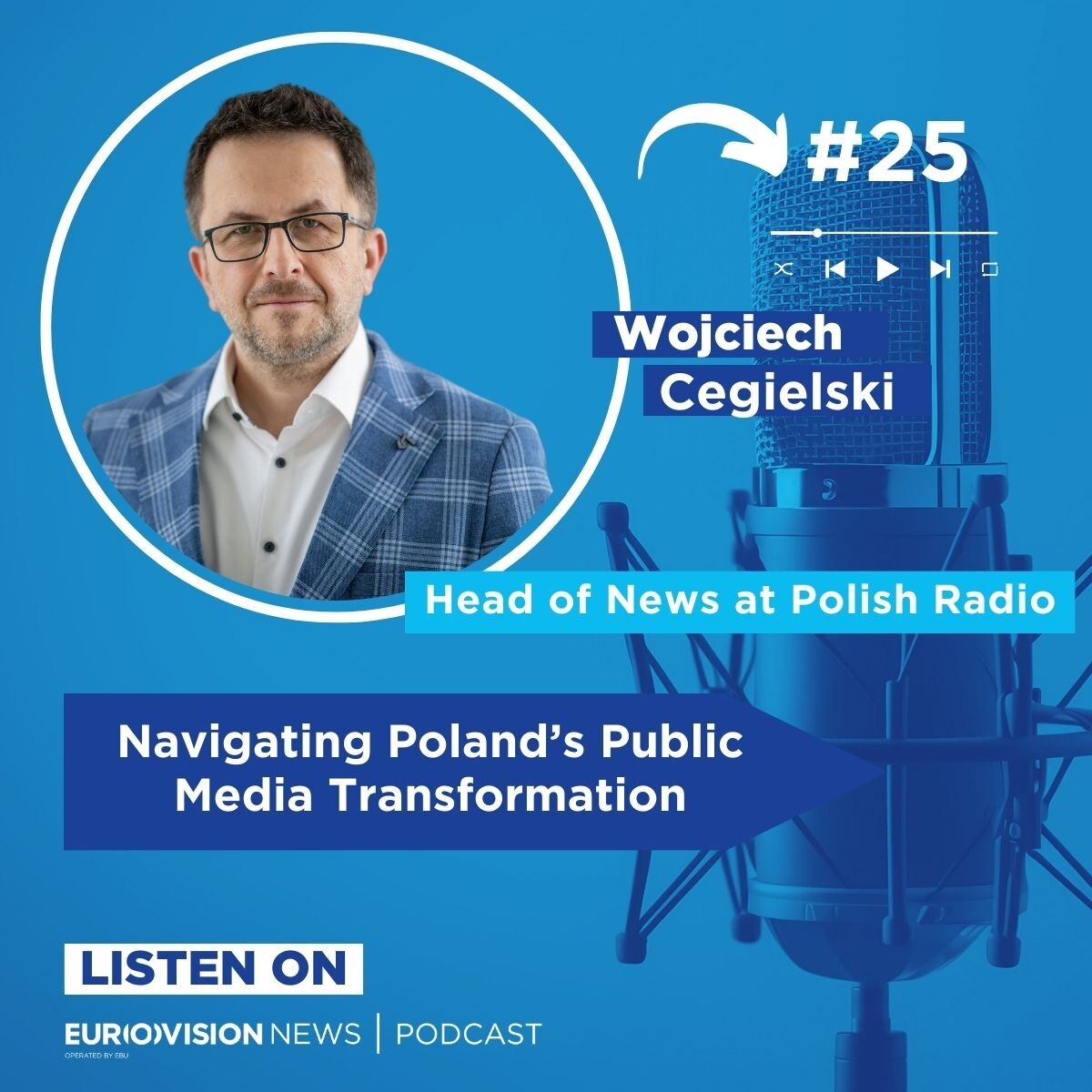Discover Eurovision News Podcast
Eurovision News Podcast

Eurovision News Podcast
Author: European Broadcasting Union
Subscribed: 3Played: 23Subscribe
Share
© Copyright 2021 All rights reserved.
Description
Eurovision News Podcast: A behind-the-scenes look at public service media news.
The Eurovision News Podcast is a bi-monthly podcast that explores how public service media organizations across Europe and beyond deliver trustworthy and reliable news to their audiences. Each episode features an interview with a guest who shares their insights, experiences, and challenges in their area of expertise. The podcast covers topics such as media freedom and safety, misinformation and disinformation, audience engagement and trust, digital transformation and sustainability. The podcast is produced by the EBU, the world’s leading alliance of public service media. If you are interested in journalism and public service media, this podcast is for you. Tune in and learn from the best practices, innovations, and collaborations of public service media around the world.
The Eurovision News Podcast is a bi-monthly podcast that explores how public service media organizations across Europe and beyond deliver trustworthy and reliable news to their audiences. Each episode features an interview with a guest who shares their insights, experiences, and challenges in their area of expertise. The podcast covers topics such as media freedom and safety, misinformation and disinformation, audience engagement and trust, digital transformation and sustainability. The podcast is produced by the EBU, the world’s leading alliance of public service media. If you are interested in journalism and public service media, this podcast is for you. Tune in and learn from the best practices, innovations, and collaborations of public service media around the world.
31 Episodes
Reverse
Valeria Kovtun is an expert in countering disinformation and building cognitive resilience. She is the founder of Filter, Ukraine’s first governmental media literacy institution. With host Laurent Frat, Valeria delves into the concept of cognitive resilience within the realm of media literacy, focusing on the misinformation and propaganda tactics employed by Russia.
Valeria shares insights on the importance of psychological resilience and personal agency in combating disinformation. The discussion highlights how long-term propaganda strategies, such as rewriting history and fostering distrust, have affected Ukrainian society. They also explore contemporary methods of spreading propaganda, including AI-generated content, and the challenges faced by the Ukrainian government and media in addressing these issues.
Valeria Kovtun on LinkedIn
In this episode, Laurent Frat sits down with Dr. Steven MacGregor, a leading expert in workplace health and wellbeing. They delve into the critical importance of integrating wellbeing into the workplace, especially for journalists and news professionals who face unique challenges.
Dr. MacGregor clarifies the essential distinctions between wellbeing and wellness, advocating for daily consistency instead of sporadic efforts. He shares practical strategies for managing stress and enhancing rest in high-pressure environments.
Tune in for valuable insights and actionable advice to improve your workplace wellbeing.
You can connect with Steven on LinkedIn: https://www.linkedin.com/in/spmacg/ , visit his website stevenmacgregor.com , and his book The Daily Reset: 365 Days of Wellbeing is available worldwide on Amazon.
The European Broadcasting Union has recently published its 2024 News Report entitled “Trusted Journalism in the Age of Generative AI.” In this episode, Laurent Frat speaks with Prof. Alexandra Borchardt, PhD, the report’s lead author, and Ezra Eeman, Director of Strategy & Innovation at NPO.
They discuss how generative AI is widely believed to be a game-changer for media accessibility and inclusiveness; however, it may also present a significant challenge to the media sector by diminishing the visibility of journalism.
The conversation also touches on the growing reliance on the services of large tech conglomerates and the broader societal and environmental repercussions.
Acknowledging the challenges that AI can also bring, their exchange concludes with some advice on the role that journalists and media organizations have to play.
- Read the report here: https://www.ebu.ch/guides/open/report/news-report-2024-trusted-journalism-in-the-age-of-generative-aiNews Report 2024: Trusted Journalism in the Age of AI
- Watch Alexandra and Nic Newman, Senior Research Associate at the Reuters Institute for the Study of Journalism, provide insights and share findings from the Reuters and EBU news reports in this webinar. https://www.ebu.ch/events/2024/06/webinar--trusted-journalism-in-the-age-of-genailink
In this episode, Laurent Frat speaks with Amanda Ripley, journalist, best-selling author, and co-founder of Good Conflict, a media training company that helps people reimagine conflict.
The conversation delves into how journalists can de-escalate conflict, what they can learn from conflict mediators and the dangers of binary thinking. Amanda covers how to work with what she calls conflict entrepreneurs, the power of looping, and the role journalists can play in combating societal polarization.
Chapters
01:00 Investigating Conflict: A Journalist's Journey
06:44 Navigating High Conflict and Healthy Conflict
12:09 Introducing Nuance in Reporting
17:05 Engaging with Conflict Entrepreneurs
28:21 Understanding Conflict and the Role of Journalists
40:19 Building Trust and Understanding Through Looping and Humility
43:39 Convening and Building Relationships: The Journalist's Role in Community
49:24 Experimenting with New Ways of Covering Conflict
Tools mentioned: thegoodconflict.com/tools
Her book: High Conflict -- Why We Get Trapped and How We Get Out
AmandaRipley.com
News avoidance is a significant concern for the news industry and society as a whole. It can lead to declining interest and engagement with news programs and hinder the public from making informed political decisions. Joining us this week is Benjamin Toff, an assistant professor at the Hubbard School of Journalism and Mass Communication at the University of Minnesota and the co-author of the book, Avoiding the News: Reluctant Audiences for Journalism. In this episode, Benjamin discusses the implications of news avoidance and the underlying causes of this trend, and proposes various strategies that organizations can implement to reach news avoiders.
In this episode, we delve into the journey of Eric Nuzum, a distinguished figure in podcasting. Eric covers the art of crafting compelling content, engaging listeners, and standing out in the dynamic world of podcasts. Don’t miss our insightful conversation about the future of audio media, featuring Eric’s expert advice on meeting changing audience demands, diversifying programming, and driving innovation in public radio.
Eric Nuzum stands out as an influential podcast innovator, with his creations frequently topping charts and garnering hundreds of millions of downloads. As a key player in NPR’s podcasting venture since 2005, Eric’s inventive foresight and strategic insight have elevated the organization to a leading role in podcast distribution. He has been behind some of NPR’s most celebrated podcasts and continued his success at Amazon, leading the development of short-form content and podcasts at Audible. In 2018, Eric applied his vast knowledge to co-found Magnificent Noise, a podcast production and consulting company based in New York City. He is also the author of the acclaimed book “Make Noise: A Creator’s Guide to Podcasting and Great Audio Storytelling.”
https://audioinsurgent.substack.com/
Since last December’s change in government, Poland’s public broadcasting landscape has once again come under scrutiny. State actions aimed at restoring journalistic integrity and independence, which were undermined by the previous government, have become headline news themselves.
In this episode, we’re joined by Wojciech Cegielski, Head of News at Polish Radio. Together, we delve into the current state of Polish public broadcasting, explore the challenges it faces, and discuss the implications for journalism and democracy.
Wojciech Cegielski
In today's episode, we delve into the challenges faced by journalists in managing their mental health amidst the demanding nature of the media industry. We're joined by John Crowley, co-director with Hannah Storm of Headlines Network, an organization that provides resources and training to support mental well-being in the media. It aims to foster conversations on mental health through its podcast series, sharing insights and stories that highlight the importance of this issue in journalism.
John Crowley is a journalist with over 25 years of experience in managing teams across various media positions. He has served as a digital editor for The Wall Street Journal in Europe, the Middle East, and Africa, and has held managerial roles at The Daily Telegraph and Newsweek.
In this episode, he talks about why he co-founded the Headlines Network with Hannah Storm after his own personal experience with burnout and the importance of their organization's work for newsrooms and with journalists across Europe and beyond.
Behind The Headlines with Headlines Network podcast
headlines-network.com
In this episode, we delve into the art and impact of storytelling in journalism. To do this, we are joined by Liam O’Brien, an award-winning documentary maker and the chair of the EBU Audio Storytelling Group. We explore the nuances of telling captivating stories, the responsibility of journalists as storytellers, and how strategic narrative can significantly enhance the connection and impact on an audience.
***Trigger Warning: This podcast episode contains discussions of abuse, including sexual abuse. Listener discretion is advised. If you may be triggered by these topics, please consider skipping this episode or listening with a trusted support person.***
Liam at RTE
EBU Audio Storytelling Group
Black Rock Boys
With hundreds of hours of video uploaded to social platforms every minute, eyewitness media is playing an ever-increasing role within newsrooms. Eyewitness Videos from bystanders and activists are emerging from all over the world, in real time, as events unfold. With this influx of real-time content, newsrooms are presented with both opportunities and challenges.
In this episode, Laurent Frat speaks with Derek Bowler, Head of Social Newsgathering at the European Broadcasting Union, and Andrew Smith, a producer and digital verification expert at the EBU. Together, we delve into the strategies and methodologies employed by the Eurovision Social Newswire to navigate this information landscape. We'll explore how they effectively discern fact from fiction and ensure responsible and ethical use of eyewitness media.
Today, on UNESCO World Radio Day, we celebrate 100 years of radio and its indispensable role as the most trusted and dependable form of media in the world. In times of emergencies and conflicts, radio becomes a lifeline for millions, providing verified and factual information. Join host Laurent Frat as he speaks with Cilla Benko, the Director General of Swedish Radio and Vice President of the EBU Executive Board, and Ibrahim Abdelbaki, the Gaza Lifeline Service Editor, a BBC Action Radio Program. They discuss the challenges radio faces in the next century, its impact in conflict zones like Ukraine and Gaza, and why radio remains the most trusted medium.
Discover how radio continues to be a vital platform for democracy, impartiality, and the importance of radio in cars. Learn why radio is more relevant than ever in our digital age.
In this episode, Laurent Frat interviews Professor Justine Cassell. Justine is world-renowned in the field of artificial intelligence and human-computer interactions. She is the SCS Dean’s Professor at Carnegie Mellon University, where she leads several initiatives on technology-enhanced learning, personal assistants, and human-computer interaction.
She is currently on leave from CMU to hold the founding international chair at the Paris Institute on Interdisciplinary Research in AI, holds the position of director of research at Inria Paris, and serves as a member of the governmental committee on the future of digital in France.
She holds dual PhDs in psychology and linguistics and has received numerous awards and honors for her groundbreaking work on embodied conversational agents, virtual humans, and social robotics.
http://www.justinecassell.com/
In this episode, Benjamin Poor shares an in-depth conversation with Laurent Frat about the innovative translation technology - Eurovox. Ben, who leads the EBU's Eurovox project, shares valuable insights on how this technology is revolutionizing broadcasting by overcoming language barriers, its role in public service journalism, and the future of translation technology in the realm of media.
https://tech.ebu.ch/eurovox
In this episode, Kate de Pury speaks with Zahra Joya, the founder and editor-in-chief of Rukhshana Media, an independent Afghan news website that focuses on women and girls' rights in Afghanistan. Zahra tells her story and challenges of establishing an independent media outlet in the current context, the impact of the Taliban takeover, and how her team continues to report despite the restrictive regime.
Zahra Joya is an Afghan journalist who left her country after receiving death threats for her work. She is now based in London, where she continues to advocate for press freedom and women’s rights in her homeland.
Zahra was named as one of Time’s women of the year 2022 for her reporting on women’s lives in Afghanistan through her news agency and received the 2022 Change maker Award from the Bill & Melinda Gates Foundation. She was recognized as one of the BBC 100 Women in December 202 and received the Courage in Journalism Award and the International Press Freedom Award for her excellent reporting.
Here’s what you’ll hear in this episode:
An introduction and welcome to Zahra Joya and a summary of her background as an Afghan journalist [0:02:00]
Zahra Joya’s stories from Afghanistan on the treatment of women and her efforts to report their stories [0:07:00]
How Rukhshana Media, an independent media outlet, operates under the Taliban regime [0:11:00]
A view of the risks and challenges faced by journalists in Afghanistan [0:16:45]
The diverse stories and achievements of Afghan women [0:28:00]
Zahra discusses the future – her hopes and vision for the next generation of women in Afghanistan [0:42:00]
7. Zahra’s thanks and shared hopes for the future [0:46:30]
Please subscribe, leave a review, and share this episode with your friends. And as always, thank you for listening to our podcast.
Producer: Laurent Frat Music: Mickey Curling Sound: Martin Lonicer
In this episode, our focus is on climate journalism. Reporting on climate change in an impactful and constructive manner is equally essential and urgent. Focusing on solutions, limiting negativity, and training our journalists to understand the broader picture is clearly one of the big challenges facing our industry.
We're in the studio with Justyna Kurczabinska, head of EBU News Strategy, and remotely with Katherine Dunn, co-author of the 2023 EBU News Report, titled: Climate Journalism that Works. Katherine is currently the content editor at the Oxford Climate Journalism Network.
We live in a world where we are constantly exposed to different types of media - news, social media, advertising etc. They can influence our thoughts, feelings and actions, and sometimes without us even being aware of it. Media literacy is not only a skill but a responsibility. By being media literate, we can become more informed, engaged and empowered citizens in the digital age. In the latest episode, we are joined by Juliane von Reppert-Bismarck, who is the founder and director of Lie Detectors, an award-winning news literacy project in Europe.
Generative AI in the Newsroom with David Caswell
David Caswell is an expert in artificial intelligence who helps news and media organizations use advanced AI technologies to improve their products and workflow.
David was previously an Executive Product Manager at BBC News and BBC News Labs and is now the founder of Story Flow.
You can follow David on Twitter @StructStories or email him at david@structuredstories.com
Check out David’s latest article: AI and News: What’s next?
If you enjoy this podcast, please subscribe and leave a review on your favorite podcast app. You can also share this podcast with your friends and colleagues who are interested in AI and news.
Russia has a history of extraordinary secrecy over its wartime losses. When it invaded Ukraine, senior correspondent Olga Ivshina of the BBC, with the help of partners and volunteers, began meticulously verifying and counting Russian losses. Olga and her team's work has so far identified more than 25,000 named individuals – setting a bare minimum of Russian casualties. Their work provides hard evidence of the war’s impact on Russian forces and has brought answers to many grieving families. Olga’s reporting sheds light on the changing face of the Russian army and the human cost of this conflict.
In this episode, Head of EBU Moscow Kate de Pury speaks with BBC Senior Correspondent Olga Ivshina about her remarkable investigation.
In this episode, we discuss mental health and journalism with Bruce Shapiro, the executive director of the Dart Center for Journalism and Trauma at Columbia University in New York. Shapiro is an expert on how journalists can deal with the emotional and psychological effects of covering violence, conflict, and tragedy. He also offers guidance to newsrooms on how to cover mental health issues in a respectful and ethical manner. Shapiro shares his perspectives on the difficulties and opportunities that journalists encounter in times of crisis. We hope this conversation will inspire and empower journalists, editors and news leaders who want to enhance their mental health and develop strategies for reporting on violence and tragedy.
Eurovision News Editor Belen Lopez Garrido speaks with Frederick Hugo Ledegaard, one of the journalists behind the investigation into Russia’s hybrid war in Europe. He tells us how he and his colleagues from public broadcasters in Norway, Finland, Sweden and Denmark worked together for over a year to uncover the ways in which Russia is using espionage, disinformation, cyberattacks and seabed warfare to undermine its neighbours and rivals. He also shares some of the thrilling moments while chasing spies, fake cell phone towers and armed Russian ships. This is a story of collaboration, innovation and courage in investigative journalism.
Comments
 United States
United States









